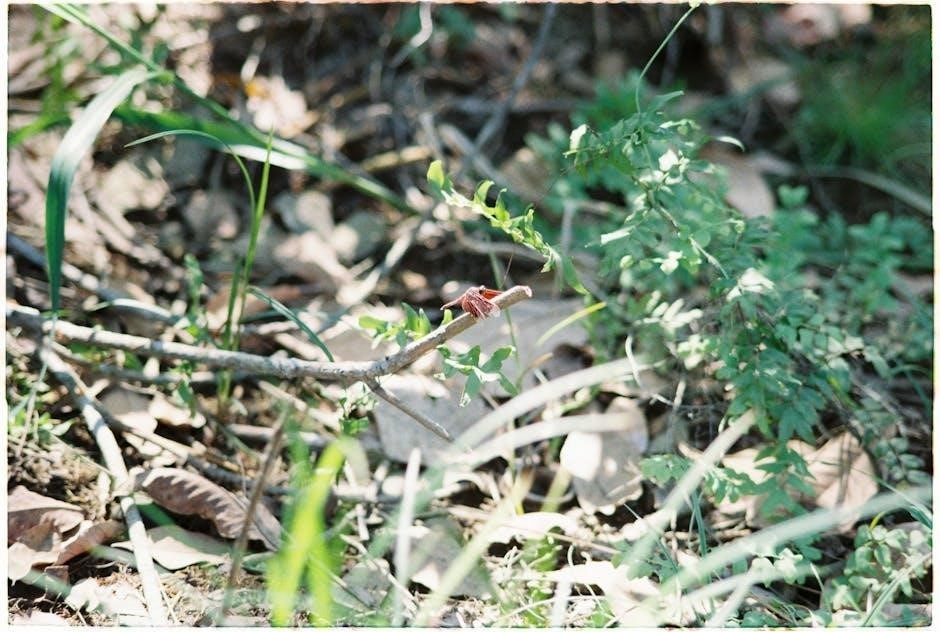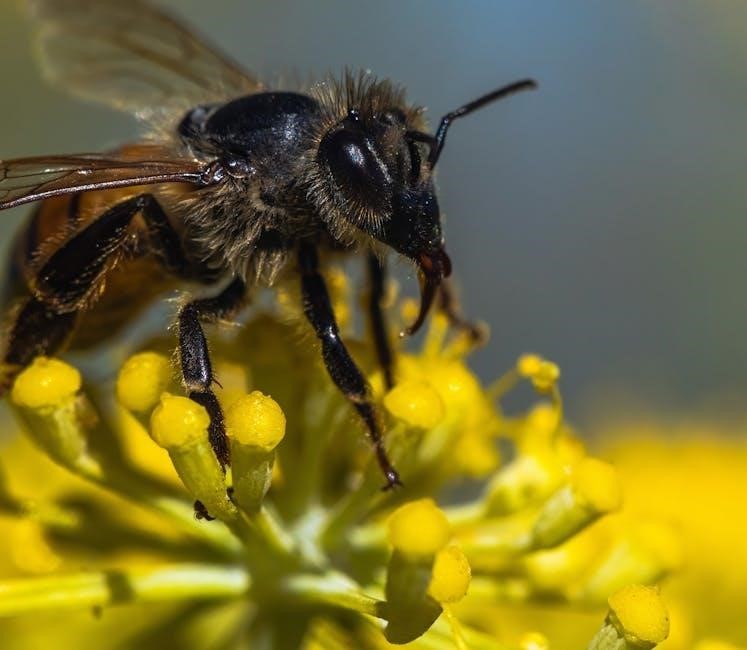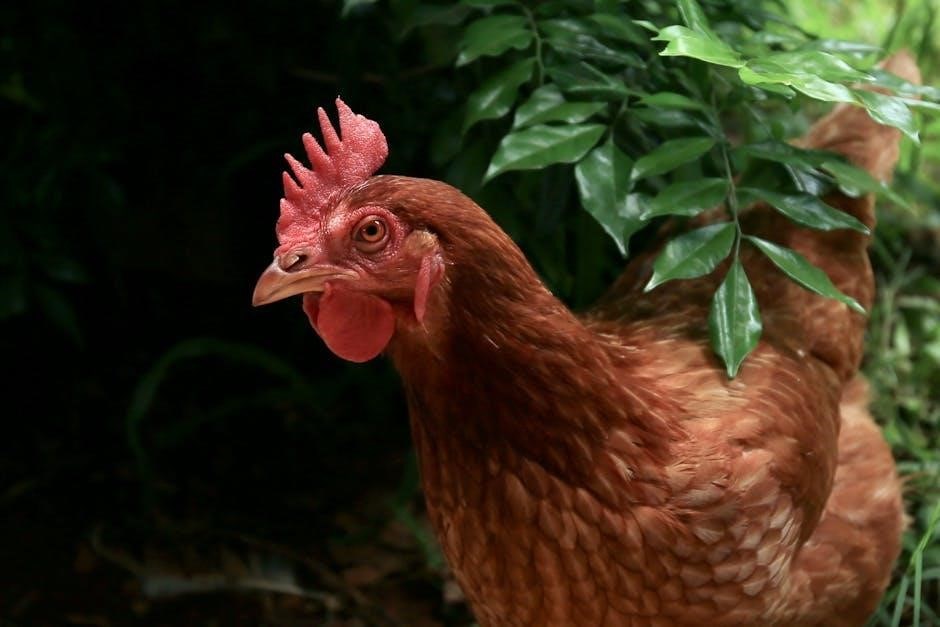
wildlife biology core curriculum online free pdf
The Wildlife Biology Core Curriculum provides foundational knowledge in ecology, conservation, and management of wildlife species. It includes core courses like Wildlife Ecology and Conservation Biology, ensuring students gain essential skills for real-world applications. Free PDF resources and online materials support comprehensive learning, making it accessible for students worldwide.
1.1 Overview of Wildlife Biology
Wildlife Biology is the scientific study of wild animals and their interactions with ecosystems. It encompasses ecology, behavior, genetics, and conservation, focusing on maintaining biodiversity. Key areas include habitat management, population dynamics, and species adaptation. The field integrates biological principles with practical applications to address environmental challenges. Free online resources, such as PDF guides, provide accessible learning materials for students. These resources cover foundational topics like ecological principles and conservation strategies, ensuring a comprehensive understanding of wildlife biology. The discipline emphasizes sustainability and ethical practices, preparing professionals to address global conservation issues effectively.
1.2 Purpose of a Core Curriculum
The purpose of a core curriculum in Wildlife Biology is to provide a standardized foundation of knowledge and skills essential for understanding the discipline. It ensures students gain proficiency in key areas such as ecology, conservation, and management. The core curriculum also fosters adaptability, enabling graduates to address diverse challenges in wildlife conservation. By integrating theoretical and practical learning, it prepares students for professional roles and further education. Accessible resources, including free PDF textbooks, support this structured approach, ensuring equitable learning opportunities for all students pursuing a degree in Wildlife Biology.
Core Courses in Wildlife Biology
Core courses in Wildlife Biology cover essential topics such as wildlife management, ecology, and conservation. These foundational classes provide a comprehensive understanding of the field, supported by free PDF materials online.
2.1 Required Core Courses
The Wildlife Biology core curriculum includes essential courses such as BIOL 125 and FOR 370: Wildlife Biology and Management, which cover fundamental concepts in ecology, conservation, and species management. These courses are designed to build a strong foundation for understanding wildlife dynamics and their interactions with ecosystems. Students are also required to achieve a minimum GPA of 2.0 in these core courses to progress in the program. Additionally, resources like free PDF textbooks and online journals provide supplementary learning materials, ensuring a comprehensive understanding of key topics in wildlife biology and conservation practices.
2.2 Foundational Knowledge and Skills
The Wildlife Biology core curriculum emphasizes the development of critical skills, including ecological principles, species identification, and data analysis. Students gain proficiency in analytical techniques, such as population modeling and habitat assessment, essential for conservation practices. Additionally, courses integrate hands-on experiences with tools like GIS and R programming for ecological research. Foundational knowledge includes understanding ecosystems, biodiversity, and human-wildlife interactions, preparing students for practical applications in the field. Free PDF guides and online resources further enhance learning, ensuring a well-rounded skill set for future wildlife biologists and conservationists, aligning with industry standards and professional requirements.
Electives and Specializations
Electives in wildlife biology allow students to explore specialized topics like wildlife management, conservation, and ecological research. Specializations include tracks in wildlife ecology, conservation biology, or species-specific studies, supported by free PDF resources and online materials for deeper learning and practical application.
3.1 Supporting Electives
Supporting electives in wildlife biology broaden students’ knowledge and skills, complementing core courses. These include topics like biodiversity, animal ecology, and marine biology, with courses such as Biodiversity (6 hrs) and Marine Biology (4 hrs). Students can also explore conservation and ecological research through specialized electives. Free PDF resources and online materials enhance learning, providing accessible tools for deeper understanding. These electives allow students to tailor their education, preparing them for professional certifications or advanced studies in wildlife biology. They ensure a well-rounded education, equipping graduates with diverse expertise for real-world challenges in conservation and wildlife management.
3.2 Specialization Tracks
Specialization tracks in wildlife biology allow students to focus on specific areas of interest. Tracks like Wildlife Ecology and Conservation Leadership build on core knowledge through advanced courses. Students can explore topics like population dynamics, habitat management, and conservation policy. These tracks prepare graduates for roles in research, management, or advocacy. Free PDF resources and online materials support specialized learning, offering practical tools for deeper exploration. This structured approach ensures students gain expertise tailored to their career goals, whether in research, conservation, or wildlife management. Specialization tracks enhance adaptability, equipping professionals to address diverse challenges in the field.
Learning Outcomes and Competencies
Students gain competencies in ecological principles, research methods, and conservation strategies. They develop skills in data analysis, species management, and habitat restoration, preparing them for professional roles in wildlife biology. Free PDF resources enhance learning outcomes, ensuring a strong foundation for real-world applications.
4.1 Key Learning Outcomes
Students develop a deep understanding of ecological principles and conservation practices. They learn to apply research methods, analyze data, and manage wildlife populations effectively. Key outcomes include proficiency in species identification, habitat assessment, and conservation planning. Graduates are prepared to address global biodiversity challenges and promote sustainable ecosystem management. The curriculum emphasizes critical thinking, scientific literacy, and ethical decision-making. Free PDF resources and online materials enhance accessibility, ensuring students gain practical skills for real-world applications in wildlife biology. These outcomes equip learners for successful careers in conservation, research, and environmental stewardship. The focus is on building a strong foundation for lifelong learning and professional growth.
4.2 Assessment Methods
Assessment methods include quizzes, exams, and practical assignments to evaluate understanding of core concepts. Case studies and projects assess application of knowledge in real-world scenarios. Peer reviews and presentations foster critical thinking and communication skills. Online resources, such as free PDF guides, provide supplementary materials for self-assessment. Continuous evaluation ensures students meet learning outcomes and are well-prepared for professional roles in wildlife conservation and management. These methods promote a comprehensive understanding of the curriculum, ensuring graduates are competent and ready to address global biodiversity challenges effectively. Regular feedback loops enhance learning and adaptability in the field of wildlife biology. The approach is holistic and rigorous.

Online Resources and Materials
Free PDF textbooks, online journals, and open-access platforms provide essential resources for wildlife biology studies. These materials cover core concepts, practical applications, and emerging research in the field.
5.1 Free PDF Textbooks and Guides
Free PDF textbooks and guides are invaluable for wildlife biology studies. Resources like Conservation Biology for All by Sodhi and Ehrlich provide comprehensive insights. Websites offer downloadable materials covering core topics such as ecology, conservation, and wildlife management. General education resources and course-specific guides are also available. These materials often include practical examples and case studies, enhancing learning. Students can access foundational texts like Wildlife Ecology and Conservation Biology for free, ensuring affordability and accessibility. These PDFs are essential for understanding key concepts and preparing for advanced coursework in wildlife biology.

5.2 Online Journals and Databases
Online journals and databases are crucial for wildlife biology research. Platforms like Conservation Biology for All and Wildlife Ecology journals offer free access to peer-reviewed articles. Databases such as PubMed and Google Scholar provide extensive resources on conservation, ecology, and management. These tools enable students to explore recent studies and case analyses. Open-access databases like ResearchGate and ScienceDirect also host valuable publications. Such resources support in-depth learning and research, making them indispensable for students and professionals in wildlife biology. These platforms ensure access to cutting-edge knowledge, fostering education and innovation in the field.

Career Applications of the Curriculum
The wildlife biology core curriculum prepares students for careers as wildlife biologists, conservation managers, and ecologists. Graduates can work in government agencies, NGOs, or private sectors, applying their knowledge to real-world conservation challenges.
6.1 Job Roles in Wildlife Biology
Wildlife biology graduates can pursue diverse career paths, including roles as wildlife biologists, conservation managers, and ecologists. These professionals work in government agencies, NGOs, or private sectors, focusing on species preservation, habitat restoration, and ecosystem management. Other roles include wildlife rehabilitators, environmental consultants, and research scientists, contributing to applied and theoretical aspects of conservation. The curriculum equips students with skills for wildlife policy development and educational outreach, preparing them to address global biodiversity challenges effectively. These careers require a deep understanding of ecological principles and practical field experience, both of which are emphasized in the core curriculum.
6.2 Preparing for Professional Certifications
The Wildlife Biology Core Curriculum prepares students for professional certifications by covering essential topics like wildlife management and conservation practices. Courses such as Wildlife Management Techniques and Conservation Biology provide the foundational knowledge required for certifications. Students gain skills in population dynamics, habitat analysis, and ecological restoration, which are critical for certification exams. The curriculum also emphasizes field research and data analysis, key components of professional certifications in wildlife biology. By completing the core curriculum, students are well-prepared to pursue certifications like Certified Wildlife Biologist and advanced roles in conservation and management.

Case Studies and Practical Applications
- Case studies on real-world conservation projects highlight practical applications of wildlife biology principles.
- Species-specific studies and regional analyses provide hands-on learning experiences.
- Free PDF guides offer detailed insights into field research and management techniques.
7.1 Real-World Conservation Projects
Real-world conservation projects provide practical insights into wildlife biology, showcasing techniques like habitat restoration and species monitoring. Free PDF resources detail field research methods, enabling students to apply theoretical knowledge. Case studies highlight successful conservation efforts, such as “A Slimy Situation” and “Conservation-A Numbers Game,” offering hands-on learning. These projects emphasize biodiversity preservation and sustainability, preparing students for real-world challenges in wildlife management. By studying these examples, learners gain a deeper understanding of ecological principles and their application in protecting endangered species and ecosystems.
7.2 Regional and Species-Specific Studies
Regional and species-specific studies focus on understanding biodiversity within distinct geographic areas, such as marine ecosystems or tropical rainforests. These studies often highlight endangered species, like amphibians in Southeast Asia, and their ecological roles. Free PDF guides provide detailed insights into localized conservation strategies, enabling students to explore niche topics. Species-specific research, such as “A Cause for Concern,” offers in-depth analysis of population dynamics and habitat needs. These studies emphasize the importance of tailored approaches in wildlife management, equipping learners with specialized knowledge for addressing regional conservation challenges effectively.
The Wildlife Biology Core Curriculum offers a comprehensive, accessible path to learning, supported by free PDF resources and online materials. It fosters conservation and ecological understanding, empowering future biologists.
8.1 Summary of Key Points
The Wildlife Biology Core Curriculum integrates foundational courses in ecology, conservation, and management with specialized electives, ensuring a well-rounded education. Students develop essential skills in data analysis, species management, and habitat restoration. The curriculum emphasizes practical applications through case studies and real-world projects, preparing graduates for diverse roles in conservation and research. Free PDF textbooks and online resources enhance accessibility, making the curriculum a valuable tool for global learners. This structured approach ensures students gain both theoretical knowledge and hands-on experience, equipping them to address contemporary challenges in wildlife conservation and ecology effectively.
8.2 Final Thoughts on Access and Impact
The Wildlife Biology Core Curriculum, supported by free PDF resources, democratizes access to high-quality education in conservation and ecology. Its structured approach ensures students worldwide can gain essential skills, fostering a global community of informed conservationists. By prioritizing practical applications and real-world challenges, the curriculum empowers graduates to drive meaningful change. The integration of online materials enhances accessibility, making it a vital tool for those passionate about wildlife preservation; This curriculum not only educates but also inspires future leaders to address critical environmental issues, ensuring a lasting impact on global conservation efforts.